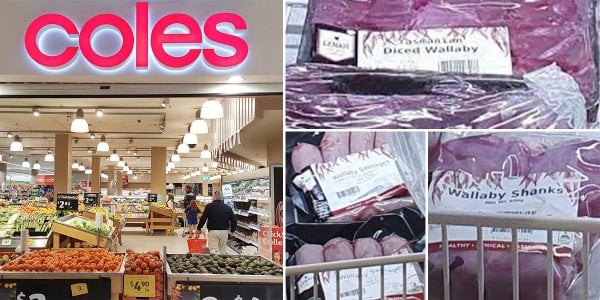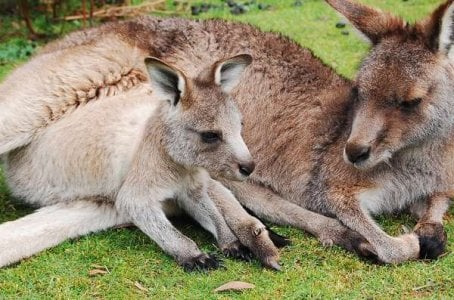You wouldn't believe what this shopper found for sale at Coles!
By
VanessaC
- Replies 27
Commercially available plant-based foods have been gaining a lot of traction in recent years, and now many supermarkets have dedicated plant-based sections in their aisles filled with vegan and vegetarian-friendly options.
That’s why one Coles shopper was so appalled when she stumbled across a bunch of products that contained neither plant nor vegetable.
One Coles shopper recently made quite a discovery in her supermarket–wallaby meat products, including diced wallaby, wallaby shanks, and wallaby sausages!
She posted on social media images of the products with her displeasure in finding them in the plant-based section underneath a variety of vegan and vegetarian-friendly products.
The displeased Coles shopper added, 'Not buying anything from that or any other Coles until they work out kangaroos and wallabies are not plants.'
Coles stores are known to have different layouts for stocking plant-based products depending on fridge availability and space.
While this customer was offended by the wallaby products, it seems there is a strong market for meat in Australia.
The pictured packs were produced by Lenah Game Meats in Tasmania, which said it 'sustainably produces delicious food from the animals which belong here'. The company’s website says its wallaby products are popular with chefs and diners from 'Cairns to Hobart' and sell out quickly at Tasmania’s fine food fairs.
'It has become a staple item on the menus of award-winning hotels and resorts across the country,' the website said. 'Unique to Tasmania, wallaby is one of nature’s finest meats. It has a rich burgundy colour, a surprisingly mild–even delicate, flavour and a wonderfully tender texture. Think of it as the “veal of kangaroo”.'
A spokesperson from Coles also confirmed wallaby meat is available in selected stores, 'Coles has sold wallaby meat in a range of products for a number of years now. Wallaby products are available in selected Victorian and Tasmanian stores.'
Laws and regulations regarding the sale of wallaby meat
While this wallaby meat discovery may have caught the shopper by surprise, it's important to remember that the trade and consumption of wallaby meat are perfectly legal here in Australia. However, there are certain rules and regulations that businesses must comply with to ensure ethical and sustainable practices–especially given the beloved status of our cute, hoppy friends.
First up is the harvesting practice, which falls under the jurisdiction of state-based laws. For instance, in Tasmania, where Lenah Game Meats operates, wallaby culling is strictly regulated. Only certified hunters can participate, and there are clear rules to ensure humane practices and minimal ecosystem disturbance.
Even after harvest, the meat must go through a rigorous quality check. The Australian Standard for Hygienic Production of Wild Game Meat for Human Consumption (AS 4464) regulates all stages of production and distribution. From the condition of the animal at the point of harvest to the subsequent handling, transportation, and storage–every step has outlined necessary conditions that must be strictly adhered to.
And of course, wallaby products crossing state lines or even heading overseas must comply with additional requirements. The Export Control Act dictates that only approved establishments can prepare wallaby meat for export, adding another layer of inspection and regulation.
That said, if like our shopper you're not keen on sharing a grill with wallaby burgers anytime soon, that's absolutely fine!
Members, what do you think about this story? Do you share the shopper’s sentiments toward meat products displayed in specialty plant-based food sections? And have you ever tried wallaby meat? We'd love to hear your thoughts in the comments section below!
That’s why one Coles shopper was so appalled when she stumbled across a bunch of products that contained neither plant nor vegetable.
One Coles shopper recently made quite a discovery in her supermarket–wallaby meat products, including diced wallaby, wallaby shanks, and wallaby sausages!
She posted on social media images of the products with her displeasure in finding them in the plant-based section underneath a variety of vegan and vegetarian-friendly products.
The displeased Coles shopper added, 'Not buying anything from that or any other Coles until they work out kangaroos and wallabies are not plants.'
Coles stores are known to have different layouts for stocking plant-based products depending on fridge availability and space.
While this customer was offended by the wallaby products, it seems there is a strong market for meat in Australia.
The pictured packs were produced by Lenah Game Meats in Tasmania, which said it 'sustainably produces delicious food from the animals which belong here'. The company’s website says its wallaby products are popular with chefs and diners from 'Cairns to Hobart' and sell out quickly at Tasmania’s fine food fairs.
'It has become a staple item on the menus of award-winning hotels and resorts across the country,' the website said. 'Unique to Tasmania, wallaby is one of nature’s finest meats. It has a rich burgundy colour, a surprisingly mild–even delicate, flavour and a wonderfully tender texture. Think of it as the “veal of kangaroo”.'
A spokesperson from Coles also confirmed wallaby meat is available in selected stores, 'Coles has sold wallaby meat in a range of products for a number of years now. Wallaby products are available in selected Victorian and Tasmanian stores.'
Laws and regulations regarding the sale of wallaby meat
While this wallaby meat discovery may have caught the shopper by surprise, it's important to remember that the trade and consumption of wallaby meat are perfectly legal here in Australia. However, there are certain rules and regulations that businesses must comply with to ensure ethical and sustainable practices–especially given the beloved status of our cute, hoppy friends.
First up is the harvesting practice, which falls under the jurisdiction of state-based laws. For instance, in Tasmania, where Lenah Game Meats operates, wallaby culling is strictly regulated. Only certified hunters can participate, and there are clear rules to ensure humane practices and minimal ecosystem disturbance.
Even after harvest, the meat must go through a rigorous quality check. The Australian Standard for Hygienic Production of Wild Game Meat for Human Consumption (AS 4464) regulates all stages of production and distribution. From the condition of the animal at the point of harvest to the subsequent handling, transportation, and storage–every step has outlined necessary conditions that must be strictly adhered to.
And of course, wallaby products crossing state lines or even heading overseas must comply with additional requirements. The Export Control Act dictates that only approved establishments can prepare wallaby meat for export, adding another layer of inspection and regulation.
That said, if like our shopper you're not keen on sharing a grill with wallaby burgers anytime soon, that's absolutely fine!
Members, what do you think about this story? Do you share the shopper’s sentiments toward meat products displayed in specialty plant-based food sections? And have you ever tried wallaby meat? We'd love to hear your thoughts in the comments section below!










